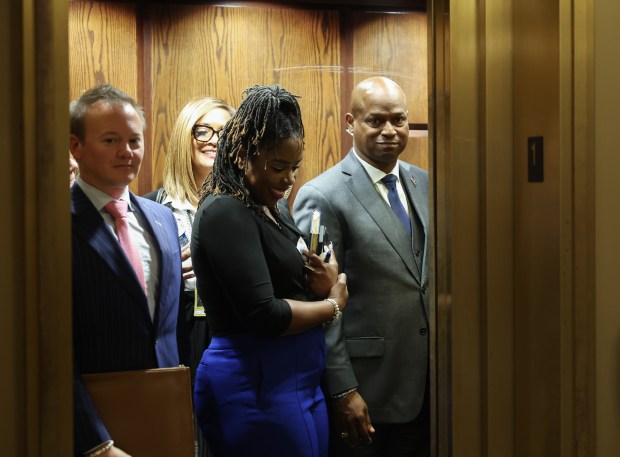Journalism took another hit on Saturday. The big bay horse, named for the profession of reporting and editing, came in a close second at the Belmont Stakes after being the favorite.
Sort of like the career many of us have chosen over the years. Close, but no cigar in the winner’s circle as the number of news operations and organizations continues to wane and lose their track records.
I was so certain that Journalism, the thoroughbred, would take the eight-horse field at the Belmont, the third leg of horse racing’s vaunted Triple Crown, that I wagered an amateur’s $10 across the board, meaning to win, place or show. That Journalism would win its second Triple Crown outing would be a celebration of the business, a vindication of unwarranted attacks on a free press.
A resurrection at the very least. It was in the cards.
Turned out, it was a punter’s Runyonesque dream. Journalism’s rival, Sovereignty, came from behind into the final eighth of a mile of the race at the track at Saratoga Race Course in New York, drew even and surged past onto victory. The race was a mirror of the Kentucky Derby, where Sovereignty bested my three-year-old, who had smashingly won the Preakness Stakes, the second jewel in the Triple Crown.
Even naming a horse Journalism is an odd choice among breeders, who usually anoint clever puns or cute monikers for their equine charges. Co-owner Aron Wellman, a one-time sports editor at his high school newspaper at Beverly Hills High, gave the horse its name.
“So journalism is something that I value very much, and I appreciate responsible and diligent journalists,” he told USA Today. Besides a few members of the administration of President Donald Trump, who doesn’t? They might have placed their bets on Sovereignty.
Yet, finding a place to lay down that $30 bet turned out to be harder than expected. Traveling to the Circa sportsbook at The Temporary casino in Waukegan’s entertainment zone at Fountain Square was a wasted trip.
Seems at the Circa you can wager various parlays on all sorts of sporting events, but not horse racing. That monopoly belongs to the Hawthorne Race Course, with the closest betting shop in Prospect Heights.
I know where Mount Prospect is and Round Lake Heights, but Prospect Heights? Where’s Arlington Park when you need it? Gone to perhaps becoming a football stadium.
Next, a check of some of the online betting sites, like Twin Spires, owned and operated by Churchill Downs, Inc., where the Kentucky Derby is held. Too many questions to fill out and fees.
Fortunately, Highrollin’ Pete from Libertyville was on his annual pilgrimage to Las Vegas, staying at the iconic pyramid-shaped Luxor on The Strip. He placed the bet through the hotel’s sportsbook.
The one-time favorite, Journalism, paid $3.20 to place and $2.30 to show, on a $2 across-the-board wager. My meager math skills translate that into $27.50 in winnings on a $30 bet. A loss.
Which is what is happening to newspapers and journalism in general. It’s acknowledged that the U.S. has lost 3,200 newspapers, more than one-third, since 2005. That’s when advertisers began turning to online marketplaces instead of print advertising, which at one time generated about 80% of a newspaper’s revenue.
Northwestern University’s Medill Local News Initiative has reported that obituaries for 127 newspapers were written in 2024. You’ve heard of food deserts? Some communities are now considered news deserts, especially in rural areas, where local news outlets have gone the way of rotary-dial phones.
A study from the Evanston university discovered that almost 55 million Americans have limited access to local news. That’s a scary number to consider when these same folks are left to rely on information from biased cable news programming, online and social media privateers, and Artificial Intelligence-generated news and feature stories.
Newsies at one regional newspaper — through no fault of their own — were embarrassed recently after a features syndicate provided a special section with AI-generated material, some of it downright false. That should be a wake-up call for the profession.
Along with the loss of print newspapers, an estimated more than 7,000 journalism jobs, including some in broadcast media, disappeared between 2022 and 2023. Many editors and reporters have taken buyouts as companies seek to trim payrolls in the face of declining readership and advertising.
Lester Holt, a former Chicago television news anchor, signed off on his last NBC Nightly News offering at the end of May after a decade anchoring the network’s half-hour evening news segment. “Around here, facts matter, words matter, journalism matters,” he said on his last broadcast.
That’s also true around here, too. Despite Journalism coming in a sad second-place finish, for journos, there’s always the next race and the possibility of winning on the nose.
Charles Selle is a former News-Sun reporter, political editor and editor.
sellenews@gmail.com
X: @sellenews





